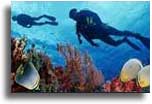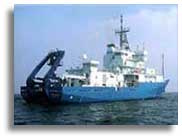OCEANOGRAPHY
Introduction to the Career
Oceanography, the science of oceans is the scientific study of all aspects of the ocean, their boundaries and their continents. To be more specific, oceanography is the study of the seas, its coastline, estuaries, coastal waters, shelves and the ocean bed. Oceanographers are scientists who study the sea. Oceanography is a relatively new science. Research conducted in the twentieth century has given the scientific world the first global glimpse of how the oceans work. It is now known that the oceans, atmosphere, solid Earth, and living organisms are part of an intertwined global system. Many oceanographers and limnologists are the ones who conduct studies related to changes in this global system, both natural changes and those caused by human activities.Oceanography incorporates the features of many sciences, which includes biology, chemistry, geology, and meteorology. For this reason, oceanographers have varied backgrounds and do many kinds of work.
Oceanographers may work on ships or in laboratories on land. Some work for private companies. Most work for research institutes or government agencies, or hold teaching and research jobs in colleges and universities.Oceanographers who conduct research, study many aspects of the sea. Such findings usually provide valuable information for industry and government. The fishing industry, for example, is interested in the life cycles and food chain of marine life.The federal government and the ship building industry use this kind of information about the sea to design new ships. Oil and mining companies are looking to the sea for new sources of fuel and minerals. Plants and animals found in the ocean are used for medical research. Researchers are also trying to find new sources of food made from marine animals and plants.
Deep-sea biology, the study of life in the ocean's deepest realms, is but one area of research in the field of oceanography.Many oceanographers are currently working on answers to such questions and problems as predicting the impact of increased carbon dioxide and other greenhouse gas emissions; increased ultraviolet radiation resulting from ozone depletion; the effects of excess nutrients in coastal waters due to fertilizers, pesticides, or habitat destruction; the short- and long-term effects of increased acidity due to burning of fossil fuels and the impact of various fishing practices on commercially important marine animals like fish and lobsters.
Oceanographers apply the basic sciences to the studies of the sea, its contents, and the surrounding environment. Most often the oceanographers are the chemists, physicists, biologists, or geologists who bring knowledge of those fields to studies of the oceans. Similarly limnologists are the one who study lakes, rivers, ponds, streams, and other freshwater bodies. All these scientists collaborate with one another and with engineers, social scientists, journalists, policymakers, and others on complex, challenging problems as they work to expand knowledge of the world's oceans, lakes, and rivers. Oceanographers are the ones who work in laboratories ashore, on ships and submersibles at sea, and in coastal environments.
Nature of work and Job Description

Biological oceanographers

Chemical oceanographers

Geological oceanographers

Their research on ocean rocks and sediment provides information about Earth's recent and long-ago history.
Physical oceanographers

Ocean engineers

Marine policy

Science journalists

Employment Opportunities
The marine sciences offer many employment opportunities. Those interested in pursuing research careers will find opportunities in academia, industry, government, nonprofit and nongovernmental organizations, consulting firms, and, in some cases-like aquaculture, the growing of marine life for food and medicines-owning their own businesses. Most consultants, however, have prior experience in some aspect of research or teaching before either venturing out on their own or joining a consulting firm. In an academic career most of the jobs involve conducting research and teaching undergraduate and graduate students, and require at least a master's degree and usually a doctor of philosophy (Ph.D.) degree.
Academic Careers

When not in the field or at meetings, these oceanographers spend a significant amount of time in the laboratory running experiments, or working on computers to analyze data or develop models. Oceanographers employed at universities also spend some time teaching.
Administrative Jobs : Many oceanographers have administrative jobs, either with academic institutions or with government or private agencies. These oceanographers spend more time in the office, writing reports and giving presentations on their recommendations. They also attend national and international conferences to keep abreast of developments in their fields.
Private Industry : In private industry, insurance companies, for example, rely on oceanographers to predict and understand weather-related hazards and natural disasters. Transportation industries mostly rely on similar information in shipping, whether by air or sea. Jobs in some nonprofit organizations concentrate on environmental advocacy, whereas in other nonprofit institutions oceanographers may develop instruments, systems, and methods for exploring the seas.
Medical Research : A new area in which graduates of oceanography programs, particularly biological oceanography programs, are finding employment is in medical research industries, including biotechnology.
Marine engineers and technicians: are need to maintain the oceanographic observation equipment, such as the complex arrays used in submersibles. Technological advances mostly into the instrumentation create cutting-edge job opportunities in the public and private sectors.
Key Career Aspects
While academia is still the largest employer for oceanographers, a survey of marine scientists revealed several key aspects to a career in this field. First, oceanographers will hold a number of jobs in a variety of sectors, public and private. Secondly most of the oceanographers can expect to change jobs fairly frequently. Finally, there are many entry-level career possibilities for new graduates, such as internships, externships, traineeships, and teaching and research assistantships, provide knowledge useful and sometimes critical to the next step. These commitments, lasting from several months to two years, will give early career oceanographers an edge over others who lack experience in the field. Volunteering is also an excellent way to break into a career in oceanography or limnology.
Eligibility
Educational:
Those with graduation in pure science can go for a course in oceanography. In almost all cases mathematics is required as well. A doctorate, a master�s degree in any basic science is essential to commence marine research. Most of the courses in oceanography are of three years duration. A highly specialized professional training is involved and is mandatory for a career in this field. Specialized branches of oceanography are chemical, geological, physical and marine biology. The most prestigious institutes conducting courses in this field are: IIT Madras, Mumbai Institute of Technology, Cochin University of Science and Technology, Annamalai University and Karnataka Engineering College.
Personal attributes:
Love for the ocean, sea-worthiness (should not be seasick), a sense of adventure, physical stamina, enduring patience, ability to withstand boredom and loneliness, a curious and analytical mind, co-operative nature to work in a team, love for exploring new places and appreciative of nature and its wonders. Apart from all these, knowledge of swimming and diving are essential attributes. A bachelor's degree serves as the minimum requirement for beginning positions. Students can earn a degree in oceanography or take courses in oceanography and major in a related field such as biology, physics, chemistry, or engineering. Graduate training is usually required for advancement. A doctoral degree is required for college teaching and for many research positions
Desired and Essential skills
Most oceanographers are mostly involved in both teaching and research. They may spend long periods of time at sea collecting samples and gathering information. Living and working space on some ships may be cramped. Oceanographers generally endure some physical hardship. Depending on their specialties, most of the oceanographers may use scuba diving equipment specially designed submarines. Because this kind of the field is competitive, oceanographers may work long hours preparing papers for publication in scientific journals.
Courses
- Marine Biology
- M.Phil. Oceanography
- M.Sc. Marine Biology
- M.Sc. Oceanography
- M.Sc (Marine Geology)
- M.Sc. (Ocean Life Sciences)
- For M.Sc. (Marine Geology) the requisite qualification is B.Sc. with Geology main or equivalent exam
- For M.Sc. (Ocean Life Sciences) the requisite qualification is B.Sc. with Botany or Zoology as main subjects
Institutes Offering Courses
Oceanography |
Remuneration
The starting salary after post graduation can be in the range of Rs 6,500 to Rs 8,000 per month in the government sector and slightly higher in the private sector.
With a Ph.D., you can earn about Rs 10,000 to Rs 12,000 per month.

